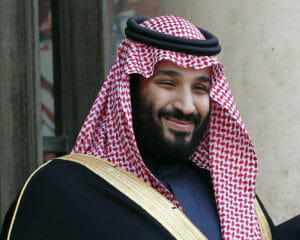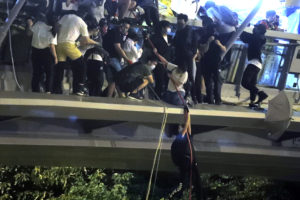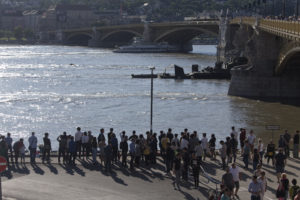Glenn Greenwald Warns That Press Freedom Is at Risk as the U.S. Seeks to Arrest Julian Assange
With the Trump administration preparing charges against the WikiLeaks founder (pictured) and refusing to rule out prosecuting mainstream media outlets, the prizewinning journalist examines the potential impact.The Trump administration wants to arrest Julian Assange and is preparing charges against the WikiLeaks founder, a situation that is raising concerns among many, including prizewinning journalist and Intercept co-founder Glenn Greenwald.
CNN reports:
The Justice Department investigation of Assange and WikiLeaks dates to at least 2010, when the site first gained wide attention for posting thousands of files stolen by the former US Army intelligence analyst now known as Chelsea Manning.
Prosecutors have struggled with whether the First Amendment precluded the prosecution of Assange, but now believe they have found a way to move forward.
During President Barack Obama’s administration, Attorney General Eric Holder and officials at the Justice Department determined it would be difficult to bring charges against Assange because WikiLeaks wasn’t alone in publishing documents stolen by Manning. Several newspapers, including The New York Times, did as well. The investigation continued, but any possible charges were put on hold, according to US officials involved in the process then.
The US view of WikiLeaks and Assange began to change after investigators found what they believe was proof that WikiLeaks played an active role in helping Edward Snowden, a former NSA analyst, disclose a massive cache of classified documents.
U.S. Attorney General Jeff Sessions confirmed Thursday that arresting Assange is a priority.
“We are going to step up our effort and already are stepping up our efforts on all leaks,” Sessions said. “This is a matter that’s gone beyond anything I’m aware of. We have professionals that have been in the security business of the United States for many years that are shocked by the number of leaks and some of them are quite serious. So yes, it is a priority. We’ve already begun to step up our efforts and whenever a case can be made, we will seek to put some people in jail.”
On Friday, during an appearance on CNN, Sessions left open the possibility of prosecuting mainstream media outlets, as well as WikiLeaks. ThinkProgress reports:
Sessions was asked by anchor Kate Bolduan whether “folks should be concerned that this would also open up news organizations like CNN and the New York Times to prosecution.”
Sessions wouldn’t rule anything out.
“That’s speculative, and I’m not able to comment on that,” he replied.
Assange’s lawyer, Barry Pollack, did not have knowledge of imminent prosecution.
“We’ve had no communication with the Department of Justice, and they have not indicated to me that they have brought any charges against Mr. Assange,” Pollack said in a CNN interview. “They’ve been unwilling to have any discussion at all, despite our repeated requests, that they let us know what Mr. Assange’s status is in any pending investigations. There’s no reason why WikiLeaks should be treated differently from any other publisher.”
On Friday, Greenwald appeared on Democracy Now! to discuss how the prosecution of WikiLeaks threatens speech and press freedoms for everyone.
I think the key point here to understand is the way in which governments typically try and abridge core freedoms, because what they know is that if they target a group that is popular or a particular idea that people agree with, there will be an uprising against the attempt to abridge freedom. So what they always do, for example, when governments try and abridge freedom of speech, is they pick somebody who they know is hated in society or who expresses an idea that most people find repellent, and they try and abridge freedom of speech in that case, so that most people will let their hatred for the person being targeted override the principle involved, and they will sanction or at least acquiesce to the attack on freedom because they hate the person being attacked. But what happens is, the abridgment then gets institutionalized and entrenched. And that way, when the government goes to start to apply this abridgment to other people that you like more, it’s too late, because you’ve acquiesced in the first instance. And that’s why groups like the ACLU, when they want to defend civil liberties, are often—so often defending the most marginalized and hated groups, like neo-Nazis or white supremacists or the KKK, because that’s where the attacks happen.
Watch the entire interview with Greenwald below.
Assange remains in the Ecuadorean Embassy in London — where U.S. authorities cannot touch him unless he is extradited — and Lenin Moreno, the new Ecuadorean president, has said he will not extradite Assange, The Guardian reports.
In a Washington Post op-ed published last week, Assange said that “WikiLeaks has the same mission as the Post and [The New York] Times.” Meanwhile, CIA Director Mike Pompeo called WikiLeaks a “non-state hostile intelligence service often abetted by state actors like Russia” and said that WikiLeaks is not protected by the First Amendment.
Assange responded to Pompeo’s comments in an interview with Jeremy Scahill this week.
Pompeo said explicitly that he was going to redefine the legal parameters of the First Amendment to define publishers like WikiLeaks in such a manner that the First Amendment would not apply to them. What the hell is going on? This is the head of the largest intelligence service in the world, the intelligence service of the United States. He doesn’t get to make proclamations on interpretation of the law. That’s a responsibility for the courts, it’s a responsibility for Congress, and perhaps it’s a responsibility for the attorney general. It’s way out of line to usurp the roles of those entities that are formally engaged in defining the interpretations of the First Amendment. For any—frankly, any other group to pronounce themselves, but for the head of the CIA to pronounce what the boundaries are of reporting and not reporting is a very disturbing precedent. This is not how the First Amendment works. It’s just—it’s just legally wrong.
While some people dislike the material WikiLeaks publishes, the anti-secrecy organization has a 100 percent record for accuracy since its founding in October 2006, according to Ben Wizner, director of the American Civil Liberties Union’s Speech, Privacy, and Technology Project. Wizner referred to this fact during a CNN interview, saying, “Never in the history of this country has a publisher been prosecuted for presenting truthful information to the public.”
—Posted by Eric Ortiz
Your support matters…Independent journalism is under threat and overshadowed by heavily funded mainstream media.
You can help level the playing field. Become a member.
Your tax-deductible contribution keeps us digging beneath the headlines to give you thought-provoking, investigative reporting and analysis that unearths what's really happening- without compromise.
Give today to support our courageous, independent journalists.






You need to be a supporter to comment.
There are currently no responses to this article.
Be the first to respond.